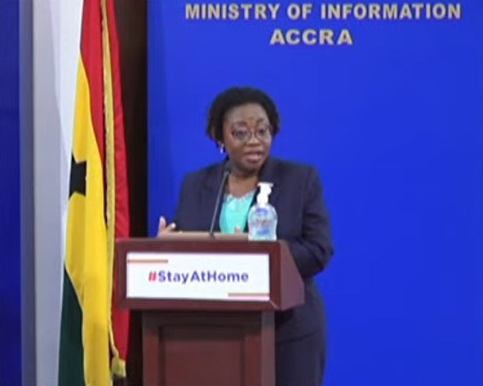The Advisor to the National Covid-19 Response Team, Dr Ama Edwin on Tuesday said Covid-19 is not a shameful disease that should cause people to hide their health status.
She advised the public to come forth with information about their health statuses to enable the health authorities to quickly and effectively initiate early diagnoses and treatment should they test positive to prevent further spread.
At the Ministry of Information's press briefing in Accra on the country's response to the Covid-19 pandemic and the matters arising, Dr Edwin advised the public to desist from stigmatising and discriminating against persons being treated for Covid-19, as well as health personnel.
"Don't treat people being treated for Covid-19 as outcasts," she said.
Dr Edwin said stigma and discrimination had the tendency to undermine all efforts by the government and health authorities to stop and contain the spread of the virus.
Stigmatisation, she said, could lead to lots of underground cases, as people with travel history, who were not yet showing symptoms, would fail to respond to calls for self-isolation, testing or mandatory quarantine.
She said such travel history or underlying chronic health conditions could lead to infection spread, complications or death if not reported early.
Dr Edwin said to deal with stigmatisation; "we must build trust in our health system, and ensure the dissemination of reliable information on Covid-19, to prevent fear and anxiety.”
The public, she said, must also show empathy towards persons who had the disease adding that because the virus was no respecter of personalities, colour, tribe or communities, no one knew who would be infected next, therefore showing love to one another was key to winning the fight against the virus.
There was the need for all to seek for better understanding of the disease in order to adopt practical measures to curb its spread, she noted.
Dr Edwin outlined some dos and don'ts when reporting on issues about the COVID-19 pandemic, which included references such as "people being treated for COVID-19, and not COVID-19 cases”.
She advised the media to use phrases such as "persons who travelled and contracted the Covid-19”, and not that they “travelled and brought it".
She spoke about the spread of false information and advised the media and the public to always fact-check their information to ascertain the truth.
Dr Edwin said the public and media must ensure they shared accurate information, rather than blindly hitting the button on their mobile phones and laptops to disseminate all manner of messages and videos, to create misconceptions and stigma in society.
She encouraged the media to engage health professionals to amplify the positive stories and breakthroughs made so far, and engage medical and other experts on their respective radio and television shows for better explanations on Covid-19.
She urged the media to also focus on ethical journalism, link people to the available support systems and the Ghana Psychology Council, for help.
Latest Stories
-
Ken Ashigbey, Joyce Aryee and others grace MTN’s Festival of 9 Lessons and Carols
5 hours -
Obuasi Cricket Academy celebrates excellence at end-of-year awards night
6 hours -
WASSCE: Scanning of objective answer sheets to start tonight – WAEC
6 hours -
Education Minister hasn’t prioritised WAEC – Nortsu-Kotoe
6 hours -
Bawumia meets Manifesto Committee members to express appreciation
6 hours -
To chocolate, Ghana’s pride by Bioko
7 hours -
Chartered Institute of Bankers, Ghana, confers Honorary Fellow status on Victor Yaw Asante
7 hours -
BoG marks end of year with Thanksgiving Service
8 hours -
Ghana’s Next Sports Minister: The Debate Begins
8 hours -
Election 2024: NPP advised to be mindful of the reasons being ascribed to their election lost
8 hours -
GNFS urges Ghanaians to prevent fires during yuletide
8 hours -
Report tobacco users who smoke publicly – FDA advises
9 hours -
Abdallah Ali-Nakyea elevated to Associate Professor at UG School of Law
9 hours -
Kick2build commissions 5 libraries in Klo Agogo, donates school supplies
9 hours -
Slim and Fit Ghana donates to kids at Motherly Love Orphanage in Kwabenya
9 hours

